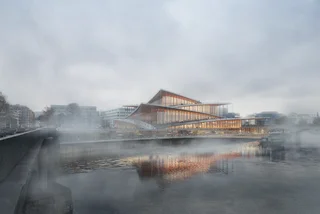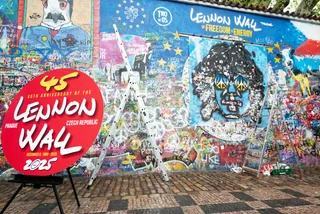Voting is now underway to determine the next mayor of Prague and the parties that will go in the City Council, placing them in charge of the city’s policies for the next four years.
The municipal elections, which are held every four years, are taking place in a single round on Sept. 23 and 24. If a party wins an outright majority, its lead candidate becomes mayor. If no party has a majority, then several must form a coalition that has a majority of seats in the Prague Assembly. The coalition will decide on the mayor, usually the ballot leader of the coalition party with the most votes, and on the make-up of the City Council.
In municipal elections nationwide, the Christian Democrats (KDU-ČSL) are defending the most mandates in municipal governments, some 3,645 seats. The KDU-ČSL will also try to retain the mayoral post in about 300 municipalities. The Civic Democrats (ODS) are defending some 2,600 seats, including the mayor posts in five of the largest 26 cities. STAN, with its partner Mayors for the Liberec Region, will be defending 2,750 seats and two mayoral posts. TOP 09 will be defending 484 seats, and the Pirates are defending 258, including that of Prague mayor, in the local elections.
The senior opposition ANO will be defending 1,684 mandates, including some 60 mayors of small municipalities and 14 of big towns, and the junior opposition Freedom and Direct Democracy (SPD) is defending 161 seats. The Social Democrats (ČSSD) will be defending 1,955 seats and the Communists (KSČM) 1,470 seats, despite both of these parties no longer being represented in the Chamber of Deputies, according to figures from the Czech News Agency (ČTK).
Three Senate seats up for grabs in Prague
Senate elections take place at the same time, with a second round of Senate elections scheduled for Sept. 30 to Oct.1. Only three Prague districts are voting for senators this time: Prague 6, 10, and 11.
The Czech Senate is the upper house of the Czech parliament. One-third of its 81 members are up for election every two years. If no candidate for a particular seat receives a majority in the first round, then a second round of voting takes place to decide between the two highest-ranked candidates.
Since only a third of the Senate seats are up for a vote, the government coalition of SPOLU, which includes the ODS, KDU-ČSL, Pirates, and STAN, is guaranteed to maintain its majority. Going into the election, it controls 71 out of 81 seats. Out of the 27 seats currently up for election, 18 are held by SPOLU. Even if it lost all of them, SPOLU would still hold 53 seats.
Expats explains Miscellaneous election facts
- The Senate deals with issues of national and international importance, like energy security and the energy crisis, national security in the face of the war in Ukraine, the economy, and the COVID-19 health crisis.
- Unlike in the lower house of parliament, which is the Chamber of Deputies, candidates for the Senate do not need to be members of a party.
- People are betting on election winners, with Bohuslav Svoboda (SPOLU) a favorite for the mayoral seat.
- Some political parties running in the election are promising free metro or to extend the public transport all night long.
- While some offices are incompatible with their mandates, senators may be ministers, presidents of self-governing regions or mayors.
- Senate plenary sessions are open to the public, who can attend them from a gallery at the Plenary Session Hall of the Waldstein Palace.
- More than 170 Romani men and women are running in this year's local elections, while one Romani is running for Senate.
- Three people from Dolní Věstonice in the Břeclav region found themselves on candidates’ list without their knowledge.
- Council elections in Břežany in the Znojmo region will not take place due to lack of candidates.
- Fifteen women from the political group Wonder WOMEN from Bzenec, a reference to the comic book heroine, are running for office in Bzenec in Hodonínsk.
The Senate’s main task is to confirm laws passed by the lower house. It can reject a bill, but the rejection can be overturned by the lower house. The bill, once it gets past the Senate, needs to be signed by the president before it becomes law. The Senate also confirms judges for the Constitutional Court.
City Hall attracts dozens of political groupings
There are 22 political groupings on Prague’s municipal ballot this year. They are assigned random numbers, so the same party won’t always be number one. Most of these, however, will not get seats in the Assembly.
Currently, the ruling coalition in Prague is led by the Pirates, who are working together with Praha sobě (Prague together), and United Forces for Prague, a group that includes Mayors and Independents (STAN) and TOP 09.
The Pirates have a platform of continuing to repair Prague’s aging infrastructure, building new bridges, and completing the metro line D. They also have been expanding the bike path network to make commuting to work easier, and are working on fulfilling a promise to plant a million new trees, their website said.
Many of their plans build upon their current policies, which include increasing affordable housing, digitizing city services, modernizing schools, making cultural events more accessible, expanding tourism beyond the city center, and expanding the social safety net.
Former mayor Bohuslav Svoboda tops Spolu pro Praha's list
The Pirate’s main competition this time is the right-wing coalition Spolu pro Praha, which is composed of the Civic Democrats (ODS), TOP 09, and the Christian Democrats (KDU-ČSL). Their main candidate is former mayor Bohuslav Svoboda. Much of their program includes continuing to develop infrastructure, such as the metro line D. Another one of their priorities is the completion of the Prague Ring Road.
Poslednà den našà kontaktnà kampaně jsme se viděli na I. P. Pavlova. Velmi děkuji za vaši podporu do voleb! pic.twitter.com/EoH0SR39NC
— Bohuslav Svoboda (@Svoboda_Slavek) September 22, 2022
They also want to extend the operation of the metro on Friday and Saturday by one hour after midnight. Less specific promises include developing “safe and meaningful cycle lanes and cycle paths” in the city, with an emphasis on those in leisure areas, and “a system of logical traffic solutions” to get rid of confusing places for cyclists and pedestrians.
Their platform also covers more affordable housing, increased safety, and plans to boost tourism through increased culture and exhibitions.
ANO offers free public transit and reduced fees
The lead candidate for the political movement ANO is economist Patrik Nacher, who is currently a member of the Chamber of Deputies. ANO's platform according to Nacher is to make life more affordable in Prague. This would include free public transport; reduced fees for waste collection, water, and sewerage; and a special energy tariff.
In terms of infrastructure, he mentioned taking care of the city's housing projects and parks. He also wants to increase the presence of police on Prague streets.
“The next four years will not be about building castles in the air or a philharmonic hall, painting blind cycle lanes, or fighting over drinking in public in Prague. The next four years will be a struggle to preserve the standard of living of Prague's single parents, families with small children, the elderly, and our children,” he said in the introduction to his platform.
STAN floats non-stop metro and civil defense shelters
Although STAN is currently part of the ruling city coalition, the party has been hit with scandals that hurt its chances at the polls. Its lead candidate is Petr Hlaváček, who is currently deputy mayor.
One of his platform plans is to extend some metro service to 24 hours a day. This would mainly be in areas that have little night tram service. Long-term projects for the city would include energy independence, according to daily Metro.
The party also plans to build more parks, create an urban tree canopy, open up more natural swimming areas, and increase flood defenses.
Among the ideas on the STAN election website is a ban on door-to-door selling, as this is both an annoyance and has been linked to burglaries. Another safety point would be the restoration of civil defense shelters that were “rented in previous years and used for purposes other than the protection of the population.”
Praha sobě wants to continue expansion of transit, culture
The last party that has a significant chance in the elections is Praha sobě, with Prague 7 Mayor Jan Čižinský and City Councilor Hana Třeštíková as its top candidates. Their platform includes more barrier-free trams, more tram lines, electric buses, and improved public transit stops. Many of these programs are already underway, as Praha sobě member Adam Scheinherr has been the deputy mayor in charge of transit.
VÄera jsme na závÄ›r kampanÄ› rozdávali vÄ›trnÃky, které jsme vlastnoruÄnÄ› vyrobili. Reakce byly fakt hroznÄ› milé.
— Jan ÄŒižinský (@jancizinsky) September 23, 2022
Za chvÃli se otevÅ™ou volebnà mÃstnosti a voliÄi rozhodnou. Za PRAHU SOBÄš mohu slÃbit, že názory voliÄů bereme vážnÄ› vždy a kdykoli, nejen ve volebnà dny :-) pic.twitter.com/7RJNMXjPNX
STAN supports the building of the new philharmonic hall as well as events at the local level. They also plan to have cultural events to help integrate foreigners into Prague life.
Praha sobě's plans to work on improving public spaces. Among their unique ideas is expanding the number of publicly accessible toilets and the number of drinking fountains in parks, according to their plan for the future of the city.












 Reading time: 7 minutes
Reading time: 7 minutes 



































